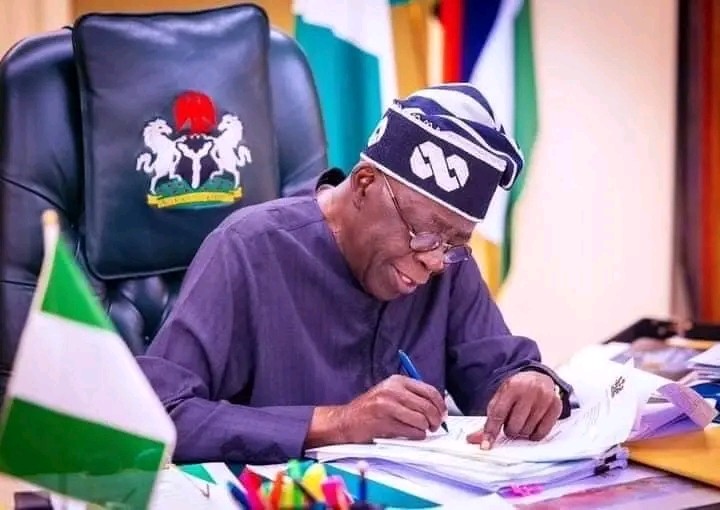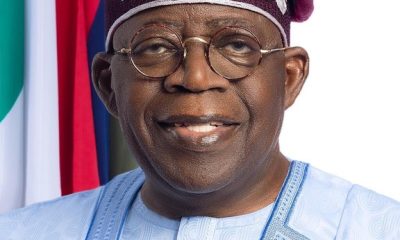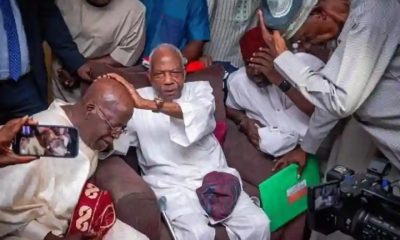News
Tinubu Stops Electricity Tariff Hike, Insists On Subsidy

President Bola Tinubu recently stopped the implementation of a hike in electricity tariff and insisted that subsidy be paid on power consumed nationwide, the Minister of Power, Adebayo Adelabu, revealed on Wednesday.
Adelabu also stated that the Federal Government would investigate the legality of the five-year licence extension given to privatised power distribution and generation companies, stressing that the operating licences of the firms would have expired on October 31, 2023.
The minister, who spoke at a press briefing in Abuja, further stated that he would sack any non-performing chief executive in agencies under the power ministry, if their non-performance would make him lose his job as minister.
Speaking on the call for a cost reflective tariff, which would lead to a hike in the amount payable for power, Adelabu said, “The power sector is an industry that is very sensitive to any leader.
“You cannot jump overnight and implement the cost reflective tariff. I can tell you that till today the government still subsidises power. Tariff should have been raised months back, but Mr President said until we are able to achieve regular and incremental power supply we can’t touch the tariff.
“So the there is a gap between the cost reflective tariff that we are supposed to charge and the allowed tariff. That huge gap the government is still handling it as subsidy. This affects liquidity in the system, investments and causes so many constraints.”
He noted that the non-implementation of this was actually causing liquidity crisis in the sector, but stressed that the President had refused to allow a raise in electricity rate.
“Now, I never said that it is not yet time to charge cost reflective tariff. Rather, I said cost reflective tariff is supposed to have been implemented months ago because it is the source of liquidity to the system.
“But for political reasons and empathy, you cannot cause additional burden on Nigerians. We just had the removal of fuel subsidy, we are talking about exchange rate skyrocketing, galloping inflation and so many others that bring hardship to the people.
“And Mr President is trying to relieve this hardship through various forms of palliatives. So it is not politically expedient and reasonable to now implement a tariff that is more like dumping the existing tariff.
“We are now paying about N70 (per kilowatt-hour), and it can never be less than N130 or N140 at the exchange rate of today if we are to implement a cost reflective tariff. Because part of the reasons for an increased tariff is the price of gas, which is paid in dollars,” Adelabu stated.
He explained that as at today, 75 to 80 per cent of Nigeria’s power was from gas power plants, “and their raw material is gas. So, once exchange rate goes up, the cost of gas also goes up and it affects the tariff.”
He, however, pointed out that tariff would be increased at the appropriate time, which would be after a lot of sensitisation and communication with the public, adding that there must also be an assured incremental and regular supply.
The minister said the about 4,000 megawatts power generation in Nigeria was shameful and unacceptable, noting that efforts were being made to increase this.
He stressed that any senior official in the ministry and its agencies who fails to deliver would have to leave, as the President had told his ministers that they must perform or be fired.
“I’m using this medium to tell my colleagues who will work with me that if your activity is not supporting my retention, you’ll leave before me. Because for me, I don’t wait to be sacked, the moment I’m not performing, I’ll leave honorably.
“But before I leave I’ll explore every opportunity to ensure I deliver, because this is not personal, this is national and national interest must prevail. So all the players in the power sector must support my vision, so that I can support Mr President’s vision,” Adelabu stated.
The minister maintained that the privatisation of the power sector in 2013 was a mistake, stressing that commercialisation should have been better.
He, however, noted that the Federal Government could still take control of the power distribution companies despite owning 40 per cent stake in the various firms.
He said the government might also carry out a review of the territorial coverage of the Discos, as most of them were handling so large territories and were delivering below expectation.
The minister said when he resumed office, the licences of the privatised power firms which he saw were for 2013 to 2023, but along the line he got to hear that there was an extension by another five years.
He said this was being investigated, adding that the government would sit with the private sector operators to agree on a performance bond which the power firms must meet.
“That is what actually matters to us now, but I can tell you that I’ve ordered an investigation into the extension of the licences, (which was) not by this administration. So we want to investigate what truly happened.
“How legally correct was it, how contractually correct was the extension?” Adelabu stated.
Whether Nigeria had started supplying power to Niger Republic, the minister said, “We have not started. We are just messengers, when they ask us to resume, we will resume.”
He said the situation in the affected country was still being monitored by the Federal Government.
According to statistics from the National Bureau of Statistics, total number of electricity customers in Q1 2022 stood at 10.63 million and 10.81 million in Q2 2022, showing a rise of 1.67 per cent on a quarter-on-quarter basis.
On a year-on-year basis, customer number in Q1 2022 declined by 1.36 per cent from Q1 2021 (10.78 million), and also fell in Q2 2022 by 2.27 per cent from Q2 2021 (11.06million).
Metered customers stood at 4.79 million in Q1 2022 and 4.96 million in Q2 2022, indicating a 3.53 per cent increase on a quarter-on-quarter basis.
Electricity supply declined compared to 6,172.19 (Gwh) and 5,882.57 (Gwh) reported in Q1 2021 and Q2 2021 respectively. Revenue generation by the DISCOs stood at 204.74 billion in Q1 2022 and 188.41 billion in Q2 2022. This shows a fall on a quarter-on-quarter basis by 7.97 per cent. On a year-on-year basis, revenue collected rose by 11.42 per cent and 1.71 per cent respectively from 183.74 billion Q1 2021 and 185.24 billion in Q2 2021.
News
Woman killed while crossing road in Anambra

The Federal Road Safety Corps (FRSC), Anambra State Sector Command, has confirmed the death of a woman in an accident at Okpoko Market on the Asaba-Onitsha Road.
The Sector Commander, Mr Adeoye Irelewuyi, who confirmed the accident to journalists in Awka on Thursday, said that the woman was hit while she was crossing the road.
He said that the accident, which occurred on Wednesday, involved a commercial tow truck with registration number XA550BMA.
“Eyewitness report reaching us indicates that the truck was towing a vehicle in an uncontrollable speed along the axis.
“The vehicle that was being towed got detached from the tow truck.
“It hit and killed a female adult, who was said to be crossing the road, while the tow truck continued its movement.
“FRSC rescue team came to the scene and took the woman to Toronto Hospital, Onitsha, where she was confirmed dead and her body deposited at the hospital’s mortuary,” he said.
While sympathising with the family of the dead, the sector commander urged motorists, especially tow truck drivers, to exercise a high level of professionalism.
He also urged the drivers to always use standard equipment and avoid speeding.
News
LASG’s maize palliative impactful, says poultry association chair

The Chairman, Poultry Association of Nigeria (PAN), Lagos State Chapter, Mr Mojeed Iyiola, said the state government’s maize palliative to members of the association made a positive impact on the sector.
Iyiola said this in an interview with the News Agency of Nigeria (NAN) on Thursday in Lagos.
“We received about 150,000 tons of maize in February from the Lagos State government as palliative to cushion the effect of high feed prices.
“The major benefit of the palliative is that it actually cushioned the cost of production for most poultry farmers in the state.
“The palliative was beneficial as it made the cost of some poultry produce, especially eggs to drop,” Iyiola said.
He noted that prior to the palliative, a crate of egg was sold between N3,500 and N3,700 at the farm gate, but after the palliative, it now sells between N3,200 and N3,400.
According to the PAN chair, retailers and middlemen who sell from N3,800 to N4,200 do that for their personal gain.
“We have urged our members to sell their eggs at reasonable prices following the receipt of the palliative from the government.
“We appreciate the Lagos State government for the palliative but we also urge the federal government to do likewise, to further reduce the cost of production in the sector.
“This will consequently lead to drop in the prices of all poultry produce across board,” he said.
He said the palliative was shared among financial members of the association at no extra cost.
“As an association we shared the grains equally across PAN’s eight zones in the state equally. We also mandated each zone not the sell even a grain of the maize.
“We, however, considered new poultry farmers who wanted to the join the association as beneficiaries of the palliative,” said Iyiola.
He noted that through the palliative, more poultry farmers were recruited into the association.
“The maize was shared only to poultry farmers and not feed millers, it is the major component of poultry feed formulation,” he said.






















